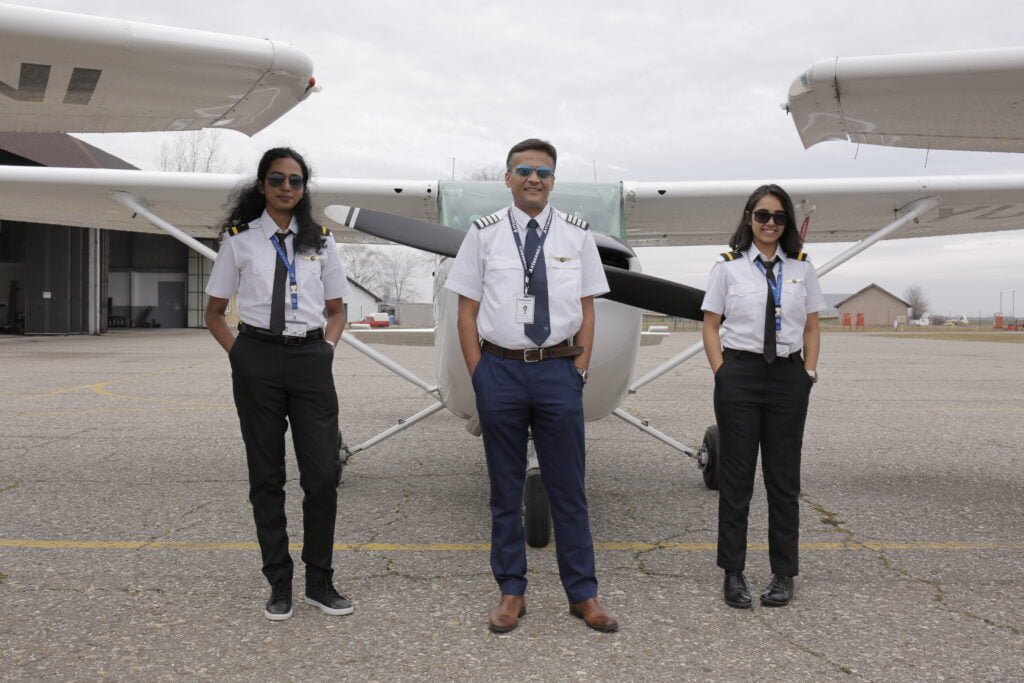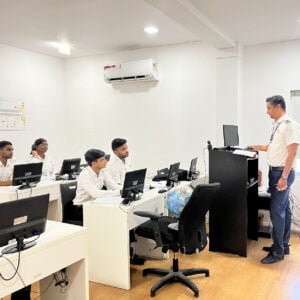Welcome to the thrilling world of aviation, where skilled pilots navigate the skies with confidence and finesse! It demands a strong sense of confidence that radiates from within the cockpit. Whether you’re soaring through clear blue skies or facing challenging weather conditions, your ability to exude confidence is key to becoming a successful pilot. In this blog post, we will explore how you can instantly feel more confident in the cockpit by honing your skills and projecting self-assurance. So buckle up and get ready for some valuable tips on boosting your confidence as a pilot!
The importance of confidence while flying
Flying an aircraft is a dynamic and high-stakes endeavor that requires split-second decision-making and precise execution. In this demanding environment, confidence plays a vital role in ensuring the safety of both the pilot and passengers on board. Confidence allows pilots to trust their own abilities and judgment.
When faced with challenging situations or unexpected events, having faith in one’s skills can help pilots respond effectively without succumbing to panic or indecision. Moreover, confidence breeds assertiveness. As a pilot, you are responsible for not only controlling the aircraft but also communicating with air traffic control and other crew members.
A confident demeanor conveys professionalism and authority, inspiring trust among your peers while enhancing overall cockpit coordination. Furthermore, maintaining confidence instils calmness in stressful situations. Flying can be unpredictable at times – adverse weather conditions or technical malfunctions may arise unexpectedly.
However, by staying composed and exuding confidence during such moments of turbulence (both literal and figurative), pilots can reassure themselves as well as their passengers that they are capable of navigating through any adversity. Lastly, confidence contributes to good decision-making.
When making critical choices related to flight paths, altitude changes or emergency procedures, a confident mindset allows pilots to assess all available information objectively and make sound judgments swiftly. Being self-assured helps mitigate hesitations or doubts that could compromise safety and ensures efficient problem-solving throughout the flight.
In conclusion, confidence is not just a bonus attribute for pilots; it is an essential quality that enhances performance, safety, and overall success in the cockpit. By recognizing its importance and actively working on boosting our own levels of confidence, we become better equipped to handle every aspect of flying with skillful poise.

How to project confidence in the cockpit
When it comes to flying, confidence is key. As a pilot projecting confidence not only boosts your own morale but also instils a sense of trust and reassurance in your passengers.
So, how can you project confidence in the cockpit? Let’s dive into some tips that will help you do just that. First and foremost, it starts with your appearance. Dressing professionally and maintaining good grooming habits shows that you take your role as a pilot seriously.
When you look the part, others are more likely to perceive you as competent and confident. Body language also plays a crucial role in projecting confidence. Stand tall with good posture, maintain eye contact when speaking or listening, and use purposeful gestures while communicating with crew members or air traffic control.
These small actions can make a big difference in how others perceive your level of self-assuredness. Another way to project confidence is through clear and concise communication. Be assertive yet respectful when giving instructions or making decisions in the cockpit. Use confident tones and avoid hesitations or excessive fillers such as “um” or “like.”
Precise communication conveys competence. Additionally, being well-prepared before each flight can greatly boost your confidence levels. Reviewing flight plans thoroughly, staying up to date on weather conditions, double-checking equipment functionality – all these steps contribute to feeling more secure about your abilities as a pilot.
Remember that mistakes happen even to the most experienced pilots. It’s important not to let setbacks shake your confidence entirely. Instead of dwelling on errors made during previous flights, learn from them and focus on continually improving yourself as a pilot.
By following these tips consistently over time, you’ll find yourself projecting an aura of unwavering self-assurance whenever you step into the cockpit – an essential trait for any successful pilot!
Tips for Gaining Confidence in the Cockpit
Practice, practice, practice! One of the keyways to gain confidence in the cockpit is through regular practice. The more time you spend flying and familiarizing yourself with different scenarios, the more comfortable and confident you will become.
Set achievable goals. Start small and gradually work your way up to more challenging tasks. By setting realistic goals for yourself, you can build your confidence step by step.
Embrace continuous learning.Take advantage of every opportunity to expand your knowledge and skills as a pilot. Attend workshops, seminars, or take additional training courses to enhance your understanding of aviation principles.
Simulate real-life situations in a controlled environment using flight simulators or mock scenarios during training sessions. This will allow you to experience various conditions such as adverse weather or emergency procedures before encountering them in actual flights.
Develop good communication skills. since they are crucial when interacting with air traffic control (ATC) and other crew members. Communicating effectively helps reduce stress levels during flight operations which ultimately boosts confidence levels.
Building confidence in the cockpit is crucial for pilot training and ultimately becoming a successful pilot. The ability to project confidence not only improves your own performance but also inspires trust among passengers and fellow crew members. By following these tips, you can instantly feel more confident in the cockpit:
Know your skills: Continuously work on honing your piloting skills through regular training and practice sessions. The more proficient you become, the more confident you will feel.
Prepare thoroughly: Proper preparation before each flight can significantly boost your confidence levels. Study weather conditions, review checklists, and familiarize yourself with the route beforehand to minimize surprises.
Visualize success: Use visualization techniques to mentally rehearse each phase of flight, from take-off to landing. Imagining yourself executing tasks flawlessly helps build confidence by creating a sense of familiarity.
Embrace challenges: Instead of shying away from difficult maneuvers or situations, embrace them as opportunities for growth and learning. Pushing beyond your comfort zone builds resilience and enhances self-assurance.
Seek feedback:Actively seek feedback from instructors or experienced pilots after each flight or training session. Constructive criticism provides valuable insights that enable continuous improvement while boosting confidence in areas where you excel.
Confidence is not just a bonus attribute for pilots; it is an essential quality that enhances performance, safety, and overall success in the cockpit. By recognizing its importance and actively working on boosting our own levels of confidence, we become better equipped to handle every aspect of flying with skillful poise.
How to project confidence in the cockpit
When it comes to flying, confidence is key. As a pilot, projecting confidence not only boosts your own morale but also instills a sense of trust and reassurance in your passengers. So, how can you project confidence in the cockpit? Let’s dive into some tips that will help you do just that.
1. First and foremost, it starts with your appearance. Dressing professionally and maintaining good grooming habits shows that you take your role as a pilot seriously. When you look the part, others are more likely to perceive you as competent and confident.
2. Body language also plays a crucial role in projecting confidence. Stand tall with good posture, maintain eye contact when speaking or listening, and use purposeful gestures while communicating with crew members or air traffic control. These small actions can make a big difference in how others perceive your level of self-assuredness.
3. Another way to project confidence is through clear and concise communication. Be assertive yet respectful when giving instructions or making decisions in the cockpit. Use confident tones and avoid hesitations or excessive fillers such as “um” or “like.” Precise communication conveys competence.
4. Additionally, being well-prepared before each flight can greatly boost your confidence levels. Reviewing flight plans thoroughly, staying up-to-date on weather conditions, double-checking equipment functionality – all these steps contribute to feeling more secure about your abilities as a pilot.
5. Remember that mistakes happen even to the most experienced pilots. It’s important not to let setbacks shake your confidence entirely. Instead of dwelling on errors made during previous flights, learn from them and focus on continually improving yourself as a pilot.
By following these tips consistently over time, you’ll find yourself projecting an aura of unwavering self-assurance whenever you step into the cockpit – an essential trait for any successful pilot! Gaining confidence takes time but by implementing these tips into your training routine,
you’ll be well on your way towards becoming a successful, polished, and confident pilot ready to conquer any challenge that comes their way!
Conclusion
Building confidence in the cockpit is crucial for pilot training and ultimately becoming a successful pilot. The ability to project confidence not only improves your own performance but also inspires trust among passengers and fellow crew members.
By following these tips, you can instantly feel more confident in the cockpit: By maintaining a balance between humility and self-assuredness, you will earn respect as a skilled aviator while projecting an air of professionalism in the cockpit.
To sum up, cultivating unwavering confidence is an ongoing process, one that requires dedication and a commitment to personal growth. If you are aspiring to become a Pilot and looking for professional guidance and end to end support, contact Aviacons for your flight training requirements.
Aviacons offers DGCA CPL Ground Classes, Commercial Pilot Training Courses. Do not forget to subscribe to receive updates.





